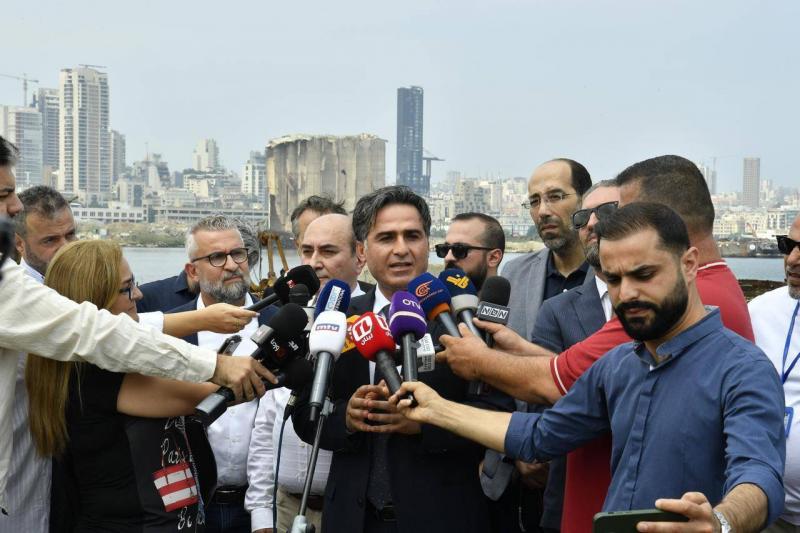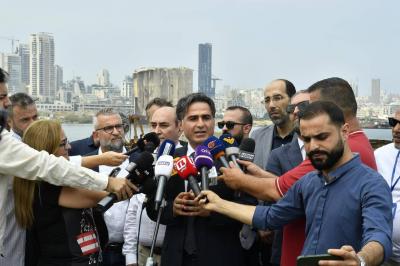Public Works and Transport Minister Ali Hemeia held a press conference today at Beirut Port, Pier 10, where he announced the commencement of the removal and sale of debris from the August 4 explosion, consisting of metals and scrap. This follows a public bidding process with the Public Procurement Authority, attended by Beirut Port's Chairman and General Manager Omar Aitani and relevant administrative and security officials.
After a tour of the metal and scrap collection site, Minister Hemeia said, "Next week we will begin selling all metals and scrap present in Beirut Port resulting from the explosion on August 4. This entails two things: the first concerns generating additional revenues for the public treasury, as it will be sold by the ton, not by any other metric. The second and most crucial aspect is that this will free up more than 150,000 square meters of land at the port, which is currently occupied by scrap. This will open the door for investment in this area for all local and global companies to invest in Beirut Port." He also noted that a public auction for selling scrap cars at Beirut Port would soon be announced, which would further free up additional land for investment.
He pointed out that the number of cars involved is approximately 1,100. Additionally, there is a set of conditions through the Public Procurement Authority for testing the soil in all port basins. Revenue from the port will be used for cleaning and renovating the basins. He mentioned, "There is also a set of conditions for contracting a company to survey the lands of the port, especially since there are lands belonging to the port that have been encroached upon, as well as some lands that have not been invested in, and these will be identified according to legal procedures in preparation for the investment of all of Beirut Port's real estate."
Moreover, there is a plan to finalize a set of conditions to inspect Piers 8, 9, and 10, where the explosion occurred, to conduct maintenance work and ensure the soil can bear the weight. He added, "In this context, there is also a set of conditions for the renovation of Pier 16, and several sets of conditions for the restoration of the passenger building and the roll-on/roll-off facilities in a vertical manner to minimize their footprint. Additionally, there is a set of conditions for deepening the basins to accommodate larger and modern ships entering the port without any obstacles or issues."
Hemeia emphasized the significant and vital role of Beirut Port and its geographic location, in addition to the rebuilding and construction process. He called for good intentions from everyone, including the state and the people, to collectively support Beirut Port, which has seen increased revenues reach the public treasury, to the point where it now provides grants from its revenues to other public administrations to operate and fulfill their missions.
In response to a question from "Wardena" about the position of the families of the port's victims, Hemeia replied, "The port has become the nerve center of life and work for all Lebanese, and it is not exclusive to anyone." He stated, "At the Ministry of Public Works and Transport, we will continue to work on establishing ports along the 220 km Lebanese coast, not just in Sidon, Tyre, Tripoli, and Beirut. We will work from the south to the north, whether through tourist ports, new waterfronts, or even commercial and logistical ones for oil and gas exploration."
For his part, Beirut Port General Manager Omar Aitani clarified that the metal and scrap collection area will be monitored by security personnel and cameras to oversee the weighing and loading of materials onto the ship, completing all legal and customs procedures, including approvals from the atomic energy agency for the company that won the tender from the Public Procurement Authority.




